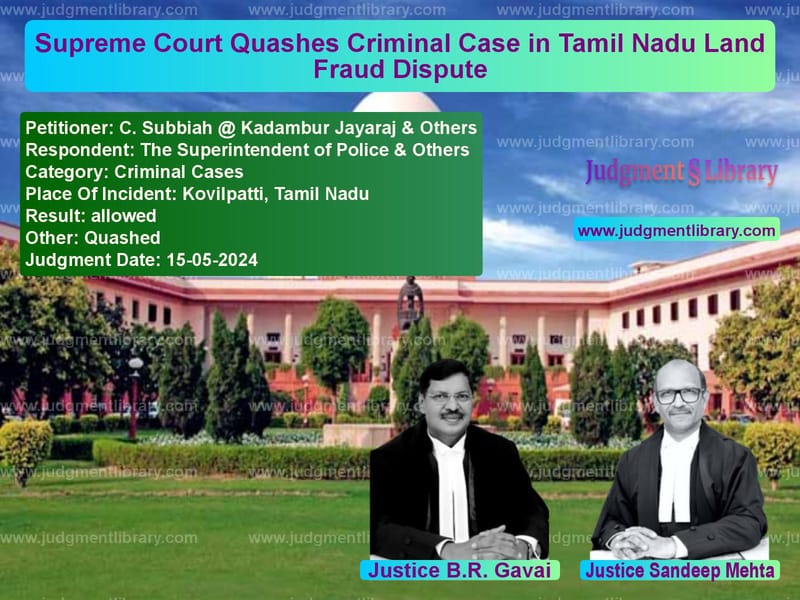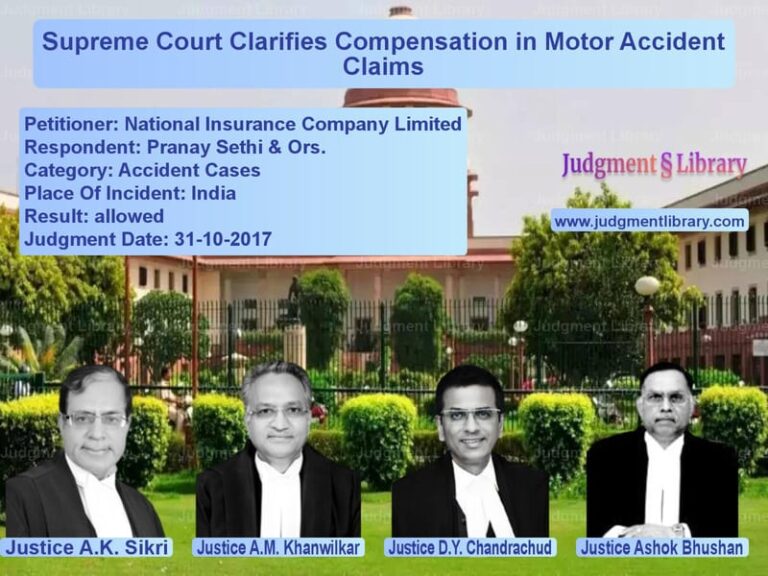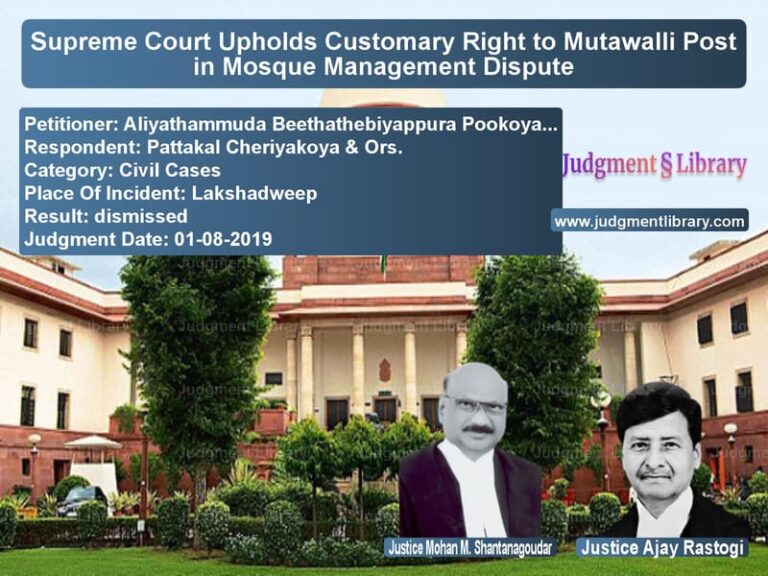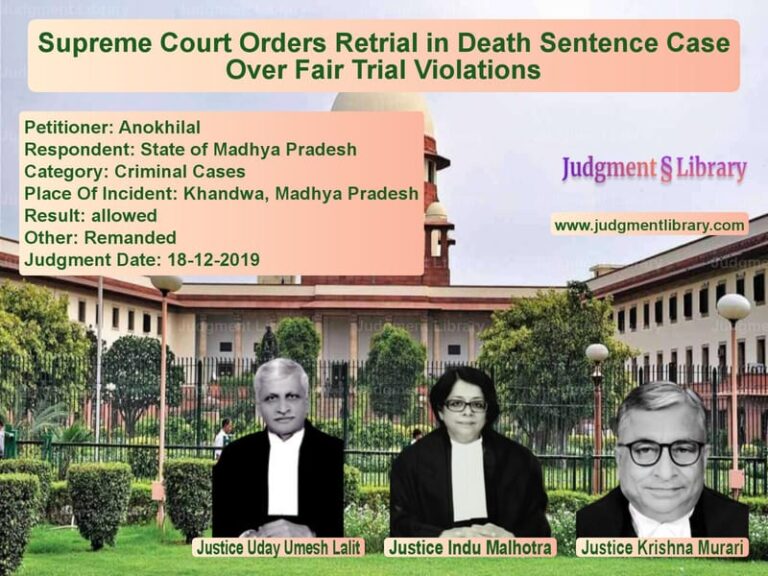Supreme Court Quashes Criminal Case in Tamil Nadu Land Fraud Dispute
The Supreme Court of India has delivered a significant ruling in C. Subbiah @ Kadambur Jayaraj & Others v. The Superintendent of Police & Others, quashing criminal proceedings related to an alleged land fraud case in Tamil Nadu. The judgment clarifies the distinction between civil and criminal disputes, holding that misuse of criminal law to settle civil disputes amounts to an abuse of legal processes.
Background of the Case
The case involved a land dispute in Kovilpatti, Tamil Nadu, where the complainant, a government teacher and former real estate businessman, alleged that he was deceived into investing substantial sums in land deals. He claimed that the accused, including C. Subbiah @ Kadambur Jayaraj and others, induced him to invest by promising high returns and political influence. However, after the deals were executed, the complainant alleged that he was denied his rightful share of profits and land.
The complainant initially sought legal recourse by filing a civil suit, but when that failed to yield immediate relief, he lodged a criminal complaint. The accused were charged under multiple sections of the Indian Penal Code (IPC), including:
- Section 420 IPC (Cheating and dishonestly inducing delivery of property)
- Section 120B IPC (Criminal conspiracy)
- Section 294(b) IPC (Obscene acts and songs)
- Section 506(ii) IPC (Criminal intimidation)
The accused challenged the criminal proceedings before the Madras High Court, Madurai Bench, which dismissed their petition. They subsequently appealed to the Supreme Court.
Key Legal Issues
- Whether the criminal proceedings were an attempt to settle a civil dispute by using criminal law.
- Whether the allegations against the accused constituted the necessary ingredients of criminal offenses under the IPC.
- Whether the complaint was barred by the Benami Transactions (Prohibition) Act, 1988.
Arguments by the Appellants (Accused)
- The transactions in question were purely civil in nature, involving profit-sharing disputes in real estate investments.
- The complainant knowingly entered into the agreements and was aware of the risks involved.
- The case was an abuse of criminal law, filed only after the complainant failed to get relief through civil remedies.
- The alleged benami transactions barred the complainant from claiming ownership under Section 4 of the Benami Transactions Act, 1988.
Arguments by the Respondents (Complainant and State)
- The accused fraudulently induced the complainant to invest and then deprived him of his rightful share.
- There was an element of criminal intent, as the accused used political influence to mislead the complainant.
- The accused had intimidated the complainant when he demanded his rightful share, making it a criminal offense.
- The presence of both civil and criminal elements does not preclude criminal prosecution.
Supreme Court’s Observations
The bench comprising Justices B.R. Gavai and Sandeep Mehta held that:
- Merely failing to fulfill contractual obligations does not constitute criminal fraud or cheating under Section 420 IPC.
- A breach of contract does not give rise to a criminal prosecution unless fraudulent or dishonest intent existed from the outset.
- The transactions were benami in nature, and under Section 4 of the Benami Act, the complainant was barred from claiming ownership.
- The criminal complaint was filed after the complainant’s civil suit failed, indicating an attempt to misuse criminal law.
The Court cited past rulings, including:
- Vijay Kumar Ghai v. State of West Bengal (2022) 7 SCC 124: Emphasizing that criminal law should not be used to settle civil disputes.
- Sarabjit Kaur v. State of Punjab (2023 SCC OnLine SC 201): Holding that a breach of contract alone is insufficient for a criminal case.
- Indian Oil Corpn. v. NEPC India Ltd. (2006) 6 SCC 736: Warning against the misuse of criminal law to put pressure on civil disputes.
Final Judgment
- The Supreme Court quashed all criminal proceedings against the accused.
- The appeal was allowed, overturning the Madras High Court’s decision.
- The FIR and charge sheet in Criminal Case No. 250 of 2012 were set aside.
- The Court ruled that the dispute should be resolved through civil litigation, not criminal prosecution.
Implications of the Judgment
- The ruling reaffirms that criminal law should not be used to resolve civil disputes.
- It clarifies the scope of Section 420 IPC, ensuring that mere contractual failures do not become criminal offenses.
- The judgment strengthens the legal standing of the Benami Transactions Act in property disputes.
- It prevents the misuse of the legal system to harass business partners through criminal complaints.
Conclusion
The Supreme Court’s decision in C. Subbiah @ Kadambur Jayaraj v. The Superintendent of Police provides a crucial precedent for distinguishing between civil and criminal liability. By quashing the criminal proceedings, the Court has reinforced the principle that criminal law cannot be used as a tool for settling financial and contractual disputes.
Petitioner Name: C. Subbiah @ Kadambur Jayaraj & Others.Respondent Name: The Superintendent of Police & Others.Judgment By: Justice B.R. Gavai, Justice Sandeep Mehta.Place Of Incident: Kovilpatti, Tamil Nadu.Judgment Date: 15-05-2024.
Don’t miss out on the full details! Download the complete judgment in PDF format below and gain valuable insights instantly!
Download Judgment: c.-subbiah-@-kadambu-vs-the-superintendent-o-supreme-court-of-india-judgment-dated-15-05-2024.pdf
Directly Download Judgment: Directly download this Judgment
See all petitions in Fraud and Forgery
See all petitions in Bail and Anticipatory Bail
See all petitions in Contract Disputes
See all petitions in Other Cases
See all petitions in Judgment by B R Gavai
See all petitions in Judgment by Sandeep Mehta
See all petitions in allowed
See all petitions in Quashed
See all petitions in supreme court of India judgments May 2024
See all petitions in 2024 judgments
See all posts in Criminal Cases Category
See all allowed petitions in Criminal Cases Category
See all Dismissed petitions in Criminal Cases Category
See all partially allowed petitions in Criminal Cases Category







